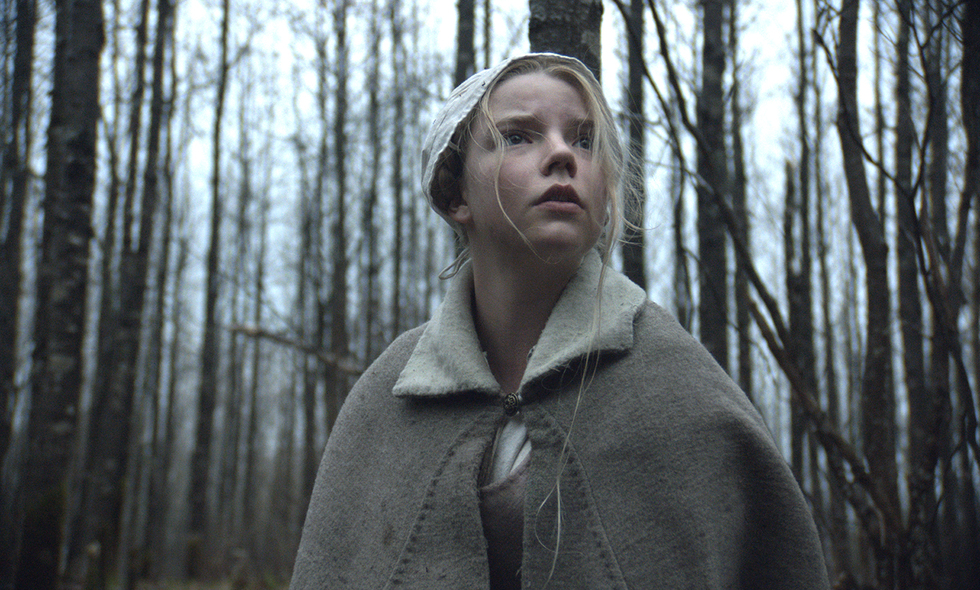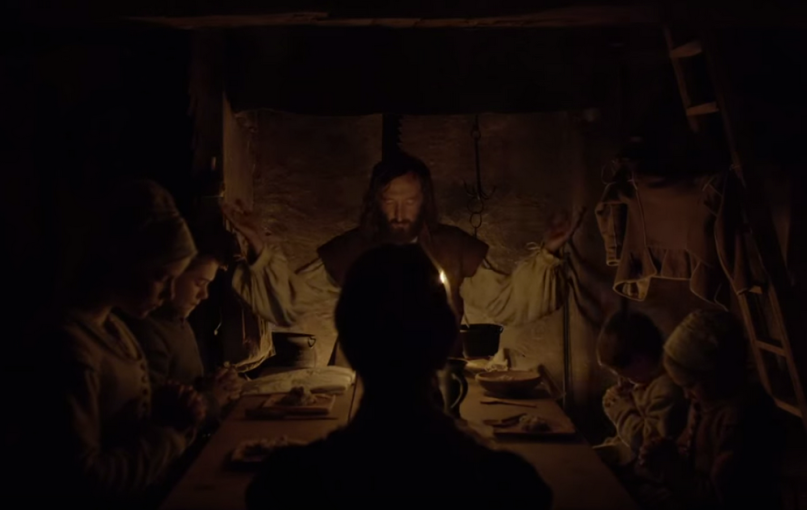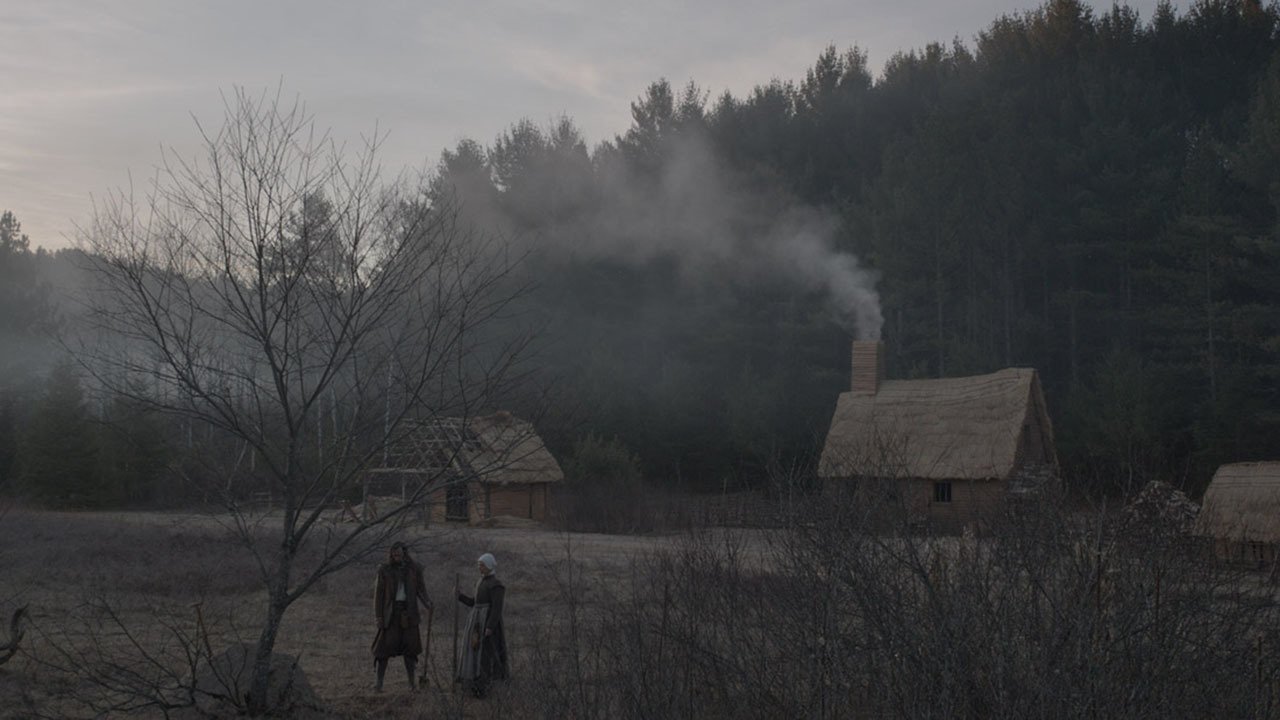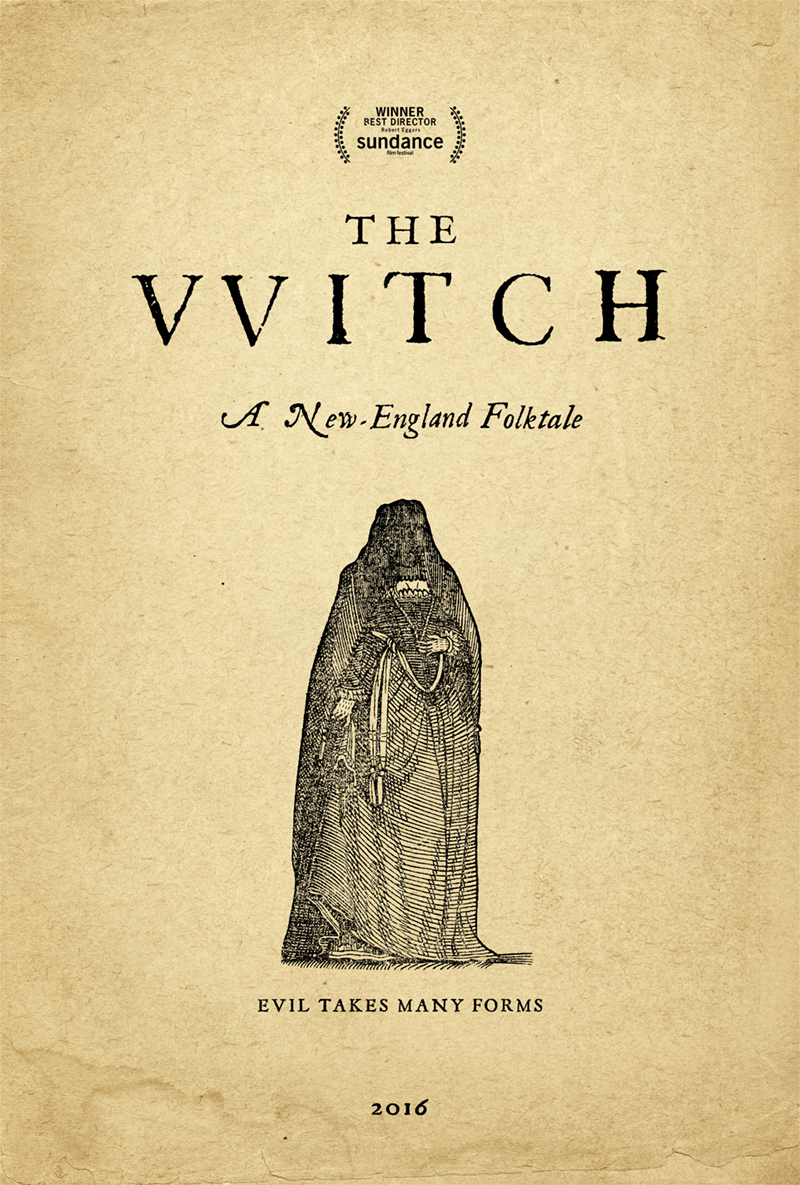‘Tis February, and as the cold doth bite at the skin one must reside within the comforts of the hearth as to thrive. Thus, ‘tis the season for tales to horrify and fright, and ist perfect moment for The Witch.
The Witch be the debut of Roger Eggers, who though he be but green hath mastery over his medium. The film’s construction ist immaculate, with sharpness to both image and edit. Kubrick dost come to mind, as do the names of Malick and Lynch, though the first Sir Stanley be the most high and prevalent of references for yon film in question. Much akin to the old man’s temper, the film is cold, morbid, oft switching moods between the terrible and the sanguine. Moments do allow itself to become humorous, and amicable. The film’s ominous score, too, brings old Kubrick to mind, as Mark Korven‘s strings allude to the Ligeti tunes applied to 2001: a Space Odyssey.
 Though Kubrick was never capable to conquer said genre quite as well as this: yae The Shining may be a masterwork, it doth cause far fewer a hair to stick up and bone to shiver. The Witch ist able to both cause thought and fear, and thus may be even more a spectacle.
Though Kubrick was never capable to conquer said genre quite as well as this: yae The Shining may be a masterwork, it doth cause far fewer a hair to stick up and bone to shiver. The Witch ist able to both cause thought and fear, and thus may be even more a spectacle.
Set deep within the age of English Colonization of our continent, The Witch followeth a small clan banished from yon Puritan colony for father’s heresy (said parent played by a gravel-voiced Ralph Ineson, who brings gravity and power to his part). The family ist left alone on the edge of a dark wood, with little food and connections to fellow Englishmen, left to trade with the Natives and hunt for food in spare and trying attempt to maintain their livelihood. It is here, in this weakened homestead, that the family does begin to a-suffer horrors of the unnatural.
 The maxim hath been “Never work with Children nor Animals” yet Eggers did decide to ignore such teachings, filling the work with both. The children, in particular, are truly spectacular, newcomers Harvey Scrimshaw and Anya Taylor-Joy art highlights in the uniformly wondrous cast. Eggers found deep feelings in these children, and one forgets the troubles one must have gone through to rangle them.
The maxim hath been “Never work with Children nor Animals” yet Eggers did decide to ignore such teachings, filling the work with both. The children, in particular, are truly spectacular, newcomers Harvey Scrimshaw and Anya Taylor-Joy art highlights in the uniformly wondrous cast. Eggers found deep feelings in these children, and one forgets the troubles one must have gone through to rangle them.
Eggers’ script is transposed from genuine transcripts from the era, and thus is written in the prose of the 16th centurie (ergo my silly attempt to recreate the verse). The detail emanates through the art design, costumes, even accents and portrayals of the demonic visages shown. Such care given to historical recreation offers the film a sense of naturalism that makes its terrors sting even more, as it lends the proceedings the aura of the laws governing reality shutting down.
 To ye who remain wary of Horror and Thrills: thou hath been proven behind the zeitgeist. After The Babadook, It Follows, You’re Next and the rebirth of James Wan, Horror has been reborne into the modern era into a great genre of import yet again. Yet even with the genre returning to its once held prominence, The Witch stands head-and-shoulders above much of its brethren. The Witch is damn near a masterwork, and a mark for a new director as one to watch for the ages. I offer thee, it would behoove you all to witness this piece. It be morbid, sharp, brilliant and horrible, and perhaps my favorite of the genre in quite an age.
To ye who remain wary of Horror and Thrills: thou hath been proven behind the zeitgeist. After The Babadook, It Follows, You’re Next and the rebirth of James Wan, Horror has been reborne into the modern era into a great genre of import yet again. Yet even with the genre returning to its once held prominence, The Witch stands head-and-shoulders above much of its brethren. The Witch is damn near a masterwork, and a mark for a new director as one to watch for the ages. I offer thee, it would behoove you all to witness this piece. It be morbid, sharp, brilliant and horrible, and perhaps my favorite of the genre in quite an age.






{ 2 comments }
Worst movie I have seen in years. Not scary, creepy, suspenseful, or tense in the least. Boring? It is that and then some. Characters I didn’t care about, doing things I didn’t care about (not to mention not taking 2 seconds to ponder anything) make up about 85% of the movie. Do not be surprised to have a good amount of chuckling going on by the audience because of how ridiculous the whole tedious affair gets.
I, conversely to the previous commenter, loved everything about this fucking film. I wish I’d seen it in theaters when I had the chance, granted, I’d have probably been absolutely disgusted by those individuals who didn’t like it and laughed at it and been starting fistfights, but hey, no accounting for taste.
It’s one of the best horror films I’ve seen ever. Its atmosphere is the time period and the culture in which it takes place. Satan and damnation were a real fear to these sad people.
It’s really a wonderful period horror fantasy. And drama. These characters in my opinion, felt quite genuine and their struggles felt real. Their arguments and decisions and thought processes felt like those real people in that time in that place would have made. It even points out the sideways manner in which sexuality in repressed, isolated people can arise. Even Thomasin’s last scene, in which (spoiler duh) she joins the coven to me felt like something someone in that situation would do. What was left for her? Travel the countryside alone back to the plantation where she would be placed under heavy scrutiny? After having murdered her own mother and witnessed her entire family fall apart and die or vanish, I mean, what else would be going through her mind but self blame and assumptions of her own damnation? Why not just sign the book and “live deliciously”?
And the horror is in wondering/worrying what will happen next. I mean, when in the first few minutes, a baby is ground up into flying ointment, anything is on the table. Also it’s not often that an attractive woman with exposed cleavage makes me squirm in my seat from discomfort. Seriously, that was the creepiest scene in the movie and no one can tell me different.
So, “What dost thou want? Wouldst thou like to taste of butter? A pretty dress? Wouldst thou like to live deliciously? Wouldst thou like to see the world?” Then I say see this fucking movie. Granted that’s your job ain’t it Simon.
Comments on this entry are closed.